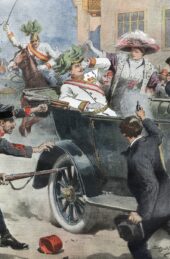Robert Harris’ new novel Precipice begins in the long summer of 1914 when Europe sleepwalked into a disastrous war and the stalemate of the Western Front. Harris moves between romance, espionage and political intrigue, placing at the centre of these events the affair between the Prime Minister Herbert Asquith and the 26-year-old socialite Venetia Stanley.
As things in Europe escalate the Prime Minister becomes increasingly out of his depth. Isolated and desperately in love, Asquith diverts himself from the constant demands of state with his relationship with Venetia Stanley. He writes to her several times a day, sharing diplomatic and military secrets. Asquith’s increasing recklessness brings him to the attention of the Security Services and Detective Sergeant Paul Deemer of Special Branch is brought into investigate the possible breach of security. Deemer starts to intercept their correspondence and becomes a spectator in their relationship.
Under terrible strain Asquith becomes progressively war weary and dependent on Venetia, while she outgrows him. No longer wishing to be a bored society beauty, or the Prime Minister’s emotional crutch Venetia finds a purpose in the war effort; reflecting women’s changing role in society as a result of the First World War.
The novel’s meandering plot perfectly captures the whimsy of Asquith’s state of mind, at this time. The Prime Minister would write to Venetia when he should have been focused on a scandalous shell shortage, the decision to launch the Dardanelles and the weakening of his government’s political position. A type of love triangle develops as Deemer reads their correspondence and becomes increasingly invested in their relationship, a fixation which has far-reaching consequences for all those involved.
The nature of Herbert Asquith and Venetia Stanley’s affair has long been a subject of speculation and debate. It was well known at the time that something was going on between them. Asquith even wrote to her during War Council meetings and was often distracted when making key decisions that affected the course of the war. The most notable of these was the decision to force the Dardanelles Strait. Asquith was also fixated on Stanley when the decision to go to war was made. However, Asquith and Stanley’s relationship had generally always been thought to be platonic. Harris having carried out painstaking research unequivocally believes that there was more to it than long letters and long drives in the country.
Robert Harris is without doubt a master of the historical fiction genre and has created a compelling narrative that brings to life a little-known historical event that had far reaching consequences for British political history. Just how distracted Asquith was in the run up to the First World War and the decision to launch the Gallipoli Campaign is a fascinating question and is something I’ve touched on myself in my novels The Assassins and The Dardanelles Conspiracy. Asquith, famed for his sharp forensic mind may have been able to change the course of events if he hadn’t been gripped by a ‘kind of madness’.
Alan Bardos is a novelist and the author of Rising Tide.







